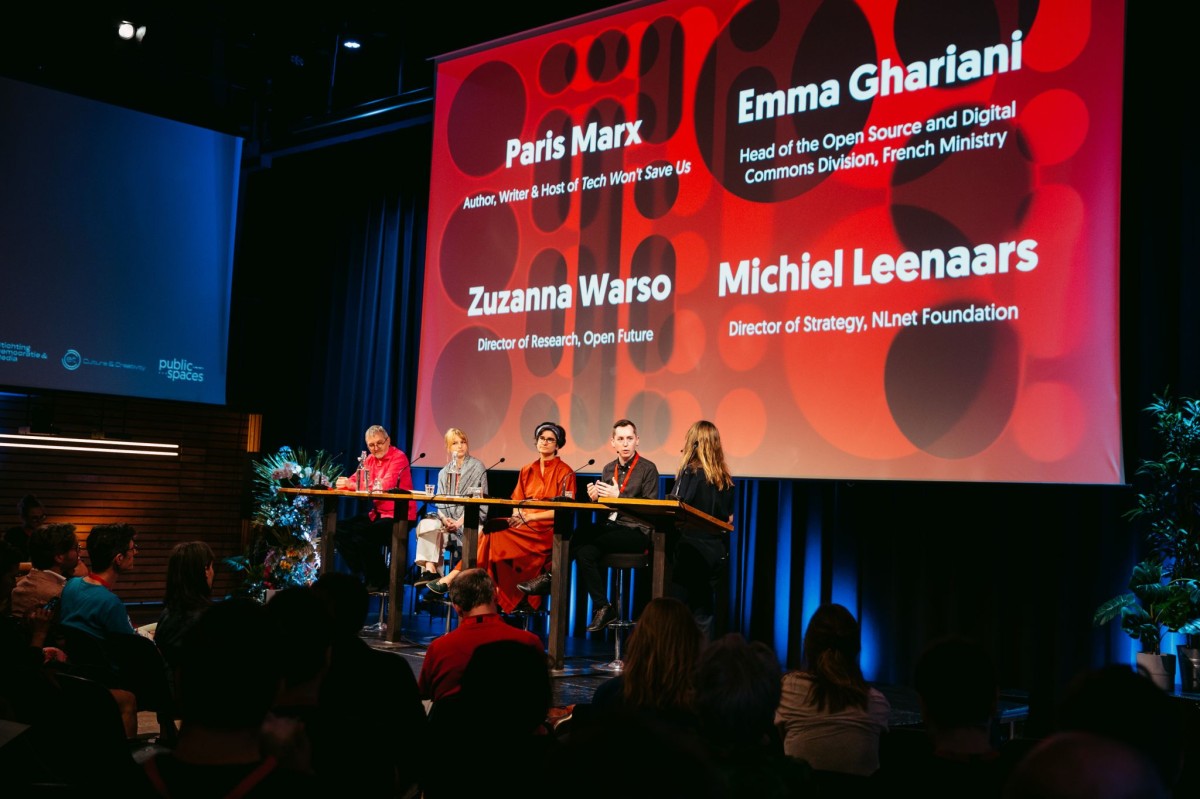The PublicSpaces Conference 2025 took place on Friday 13 June, in Amsterdam. The title “Shaping our Digital Future” expressed the need to take back control of our digital future, as said by the conference organisers, PublicSpaces and Waag Future Lab.
The Conference opened a dialogue on the deepening links between big techs, politics, disinformation and democracy, asking the question “who is shaping the internet?”.
Canadian writer Paris Marx, the voice of the award-winning podcast “Tech Won’t Save Us” opened the conference. In his speech on building just, sovereign, and sustainable digital systems, he talked about technology politics and the urgent need for publicly funded, community-rooted alternatives to big tech.
“What if we treated digital infrastructure like public libraries — places not just of access and education, but also creation? Places where communities shape the technology they need, not just what turns a profit”. That was an idea that stood out, according to the Events Foundation.

In Activist AI: Designing Proxy Voices, Julia Vernersson and Malou Lintmeijer coached a workshop on AI as a tool for collective protest.
Drawing from activist knowledge, digital design, and community organising, attendees explored AI-generated personas that could serve as ethical, accountable actors "able to say what we cannot, and without exposing real people to retaliation or hatred".
The Conference was organised with the contribution of the European Cultural Foundation, the Democracy & Media Foundation, the EIT Culture & Creativity, the Vfonds, the Internet Archive Europe and the Amsterdams fonds voor der kunst.
The sub-themes of the conference included: Digital Autonomy, the AI We Need, Sustainable World, the Future of Social Media and Media and Citizenship.
#Digital Autonomy
Opportunities to foster the European digital sovereignty were explored in the EuroStack investment framework, the EDIC legal framework and the Next Generation Internet initiative. "What is needed is a ‘resilient and democratic tech market’, that works to enhance public values and democratic practice", as said by the conference organisers on the theme of Digital Autonomy.
#AIweNeed
The panel on AI for the public good introduced ClimateGPT, among other practical AI applications supporting sustainability, cultural institutions and everyday life.
Creating Responsible AI Tools with Artists explored art as an ethical practice in making AI tools.
The "Off the Record" performance explored what happens when boys are targeted as future youth criminals, due to prediction algorithms used by the police.
#Sustainable WorldIf current growth of AI energy consumption continues, AI will be responsible for half of the world’s data centre capacity by the end of 2025. Academics Benedetta Brevini and Roel Dobbe higilighted the need for green digital literacy and "AI policies and investments, in which ecological protection is central and harmful, colonial structures are actively dismantled".
"Let's rewild the Internet" suggested Maria Farrell, keynote speaker on technology and the future. She suggested that diversity is the key to treat the internet, as already successfully used by ecologists to recover destroyed landscapes. "We need to treat the internet like a damaged and degraded natural habitat and tackle its monocultural fragility, extractive business model, and hard-right billionaire ownership".
#Future of Social Media
Alternative social media were explored, such as the Fediverse, ActivityPub, Mastodon, PeerTube and the Design Civic Social Media Toolikt for tailoring responsible and sovereign social media. They were introduced as the future of social media that "no Musk, Zuckerberg or Trump can shut down" and as alternatives to the Big Tech social media platforms who are threatening democracy as "hotbeds of disinformation, hate-speech and in full control of the broligarchy".
#Media and Citizenship
"If we want our digital world to be an extension of the world we would like to live in, we need to design digital realms that reflect democracy and citizenship", as said by the Conference organisers. They explored how to bring back "power to the people" with a special focus on how can independent media sustainably thrive without using Big Tech.
You can find more here
Images 1 & 2. Courtesy of Public Spaces Conference 2025 under a CC by 4.0 licence.









